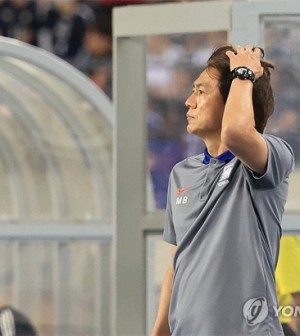South Korea head coach Hong Myung-bo defended his players in the aftermath of the team’s listless loss to Japan that cost them a chance to win the East Asian football title at home Tuesday, saying only a momentary lapse of concentration made the difference.
South Korea finished in second place behind Japan at the East Asian Football Federation (EAFF) E-1 Football Championship, after falling to them 1-0 in their final match at Yongin Mireu Stadium in Yongin, some 40 kilometers south of Seoul.
South Korea were shut out despite having a 9-4 edge in shot attempts and a 58-42 advantage in ball possession. It was South Korea’s third straight loss to Japan — the longest skid in the long history of their rivalry — and they did not score in any of those three defeats.
Despite the loss, Hong defiantly said he felt his players outperformed their opponents.
“I think Japan didn’t get to show their strengths and they did not strike fear into our defense at all,” Hong said, the volume of his voice a notch higher than usual. “Other than the scoring play, they didn’t really make our life difficult. We only conceded the goal because we momentarily lost our focus.”
Hong tried to provide the big picture. He noted that Japan have been maintaining a consistent structure that allows new players to fit right in, whereas South Korea only began experimenting with new tactics — namely, the back-three formation — at the start of this EAFF event last week.
“I am sorry to our fans that we didn’t produce the result we want,” Hong said. “But at the same time, I saw plenty of hope our players.”
Hong didn’t have the services of national team mainstays based in Europe and the Middle East, with clubs under no obligation to release them since the EAFF event isn’t on FIFA’s international calendar. This tournament instead gave Hong an opportunity to test relatively less experienced players from the domestic K League and Japan’s J1 League and see who may be able to level up and crack the World Cup squad next summer.
Without naming names, Hong said he saw a great deal of potential in “about five players.”
“I think some guys played really well in our back-three setup, and if they can keep it up, they will have a chance to play at the World Cup,” Hong said. “I wasn’t around this group of players a long time for this tournament, but I think all of them showed an excellent attitude throughout.”
Hong did identify some areas for improvement, including shoddy gap control between midfielders and defenders.
With Japan also missing their Europe-based stars and having brought a squad made up entirely of J1 League players, this match pit the best homegrown players in the two countries against each other.
When asked why Japan continue to have the upper hand in these rival showdowns, Hong said it can be traced to youth football.
“Their youth players are just trained differently, and there’s nothing we can do about that,” Hong said. “Japan have been very consistent in their approach since the 1990s, regardless of results. I think there have been times in the past when we were content with winning some matches. But it doesn’t just fall on the men’s national team. Everyone involved in South Korean football must make an effort as a whole and look past just wins and losses.”
